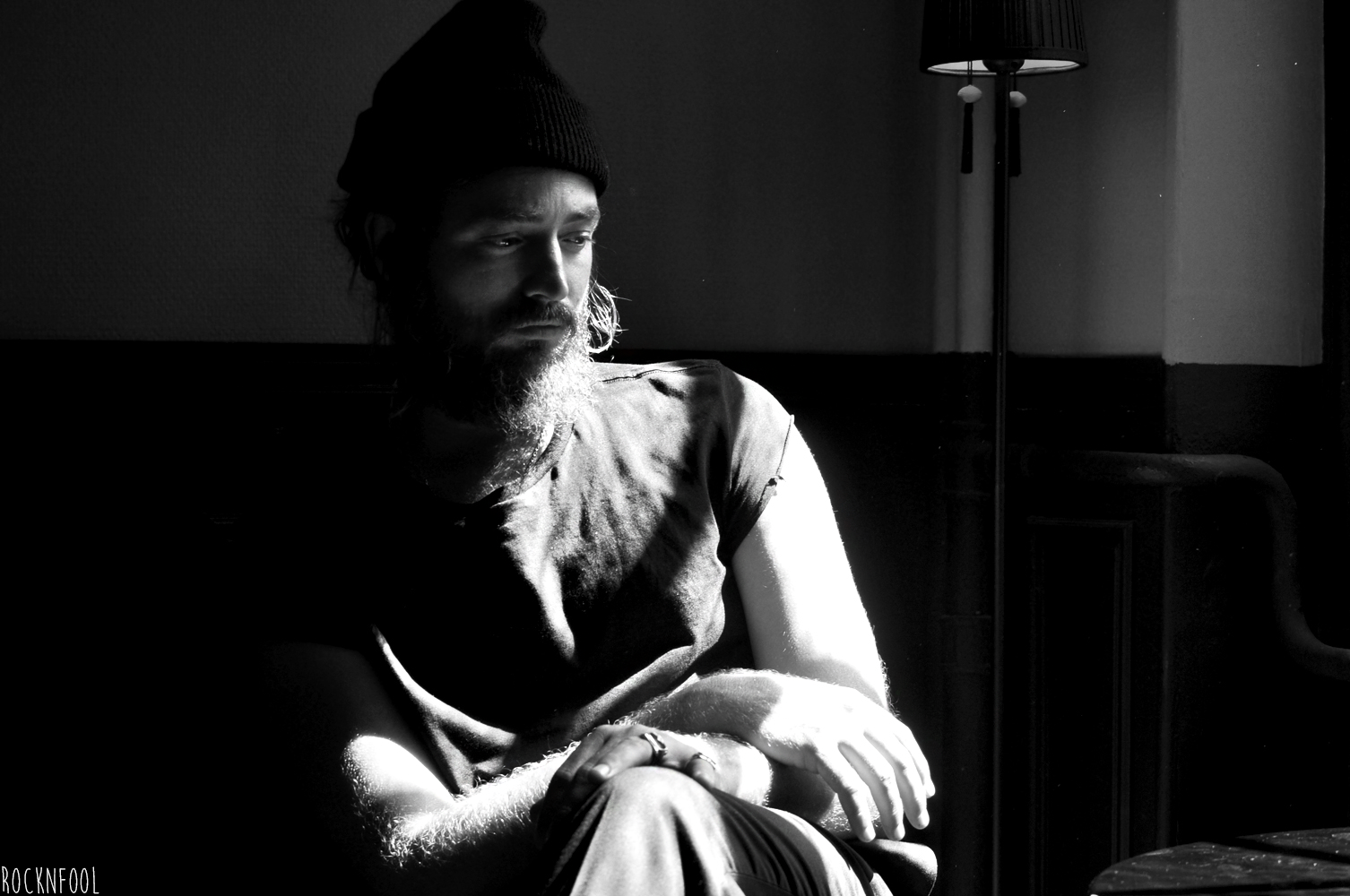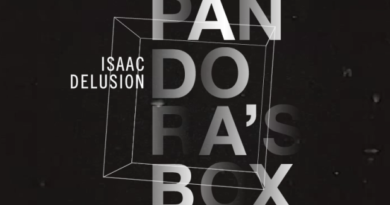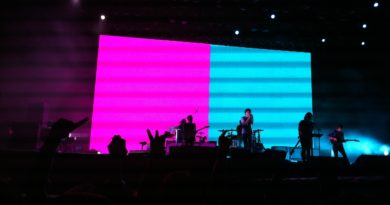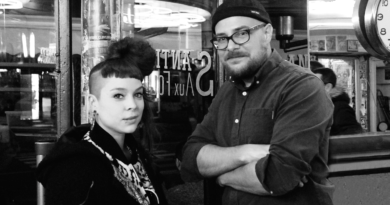RY X: ‘Sound has a tremendous ability to heal’
I guess I have to start by saying that I’ve never met someone as intense and passionate as Ry Cuming, also known as RY X. His debut album Dawn wasn’t out yet when I got to interview him, one week before his first show in Paris. We met in a nice cosy room of a Northern Parisian hotel, established in a quiet dead-end. RY X radiates this kind of peaceful and glowing aura that immediately reverberates on my mood, my anxiety of meeting this incredible guy suddenly subsides. We talked for half an hour, lulled by sunbeams, coming and going in the room, as the time was flying. I admit, I could have talked and listened to this man for hours, but I had to let him go to for more promoting tasks. Snap back to reality.

You’ve been in the music world for a while now with different collaborations and projects (Howling, RY X/Frank Wiedemann, The Acid…). What triggering factor leaded you to finally release your own work, under your almost real name?
Yeah (laughing), I don’t really like the idea of selling music in the traditional way in the industry, so I had to find a way to be out to be an artist, and do it in my own way. And it’s been tough, it’s been a challenge to sometimes fight against the industry. I put out music many many years ago and I didn’t enjoy my experience in the music industry, I left, and then started to do the music and art that I really wanted to make. And I didn’t want to share it with anybody I realised. I think it’s because a lot of that is about self-release, and self-expression. Once I did put out some things under RY X with Frank Wiedemann, to really see how much connection I had to people and see that I could circumnavigate the industry and get straight to the community, was a very liberating experience for me. Then I guess that, just to feel the response, like how I was connecting with people and what I was inspiring was really beautiful. I felt very honoured. That led me back to the industry, and I’m here now again, trying to continue to do that, trying to keep connecting with people rather than sell records, that’s my one thing.
You’ve got this beautiful Bon Iver sort of high-pitched, delicated voice. Have you ever taken singing lessons, or did that come to you naturally?
I started singing grunge and rock’n’roll-punk stuff as a teenager, almost like rapping I guess… I didn’t really have any training, I learned to sing like that originally, and then I started mimicking people. I think I started mimicking the old soul guys like Donny Hathaway and Marvin Gaye, who sang in a high-pitched voice. Then Jeff Buckley was a big influence in terms of singing that falsetto. So no, I never had any lessons.
While listening to Dawn, your stupendous debut album, I felt like an intruder into your personal life, invading your intimacy. Aren’t you afraid of exposing yourself too much, like giving a lot of yourself in broad daylight?
I think I am exposing myself, but I also think that I kind of got to the realisation, when I was doing this album, that that’s a little bit my job… It may not be what I always wanted to do, but it’s my role in some way, to myself and other people, to be able to undress myself and share really naked raw layout with people, so that they know that they can explore their own emotions in that way too, you know? Look at any really good artist in history, they’ve all stripped themselves down, unless they played a character… but it’s usually in the pop world, it’s easier. But even that can wear thin. I’m thinking of anybody like Björk… they just become so honest, and raw, they communicate things that other people wouldn’t communicate and show that’s possible. And I think it’s really brave to do that. I’ve realised that there’s a place for that, a place for me communicating from my heart to people that maybe others aren’t doing, especially male figures. It’s harder I think for a lot of men to show that side of themselves, that vulnerability and fragility… Not that those things aren’t powerful, because they are! It’s incredibly beautiful and powerful. But that’s been stripped away from a lot of people. So I guess I’m trying to do my part, to just stand there… If we’d both have to undress now, it would be an emotional experience right? (I confirm) And then we would have to stand there and look at each other… And it becomes a choice to view the flaws of you, to look at the beauty of each other human beings, or to identify flaws in our heads… I think I’ve really been much more interested in the idea of seeing the beauty in the undressing, to be out and look at the world in that way too… a little bit.
It’s a little bit my job to expose myself.
Because you obviously know you won’t be able to erase anything?
I know… but that’s what good art is I think. There’s music and there’s art, and good musicians are artists. And there’s a lot of music that isn’t art as well. I’m trying to make art, to be a really good artist, and part of the role of an artist it to do the difficult things sometimes in the greater good.
Are music and lyrics secret cover, your cocoon, to face the brutality and hardness of real life?
It’s ironic isn’t it? Because I think I write things that I wouldn’t say, I write things that I might not tell people or not tell the world, but I put them in a song. I definitively use them as a way to process and release things, to talk about my experiences. So if people could decode my lyrics, they would probably find out a lot of things about me, very real things that I don’t think I’m hiding from the world in that way. But I am definitively putting in little bit in poetry and prose, I’m not just directly saying the things, I am eluding to it, because that allows everybody to have their own experience with it. If I was just talking about me, talking about names, places…
So do you think music is necessarily a reflection of its creator?
Ultimately if they’re being honest and true yeah. I can make a punk record and it would also be real, because it would come from that side of me, angst, frustration, anything. I could pull out all in there, and go there. So it’s also depending on what side you’re expressing. I had a couple of different projects and I got to express different sides of myself in those projects too. I think that’s what I always tried to do, being more expressive, share more, create more…
People who know me well say: “why is your music sad because you’re a light-hearted person?”
I could have asked you if you were a sad person yourself…
No! (smiles). I don’t think I am a sad person. Sometimes people meet me and say “I don’t get it, you should be a very sad person because your music seems sad”. But I don’t think it has to be that way. It’s just a way for me to express those things that are not in me anymore, it’s a release. People who know me well say “why is your music sad because you’re a light-hearted person?”, and then they get to know me really really well, and they see that I have both things. Not so much sadness but darkness. I definitively have my fare share of darkness, and my fare share of weightlessness and gravity. And that side is really a part of what fuels me as an artist too. I feel things very dramatically on both sides of the spectrum. Music, yoga meditation, and different things are becoming my balance.
Good to know that you are not bipolar!
I’m not (smiles)… There’s a famous quote, at least in my mind: a person talking to a very well trained meditated Buddhist said to him: “Do you know about mental illness?” and he said: “We’re all mentally ill in a way, but it’s more determined by how we hurt each other”. He was saying that somebody who suffers mental illness is just somebody that is not being loved, not taking care of, not understood and accepted for who he is. Take a big oil company destroying rainforests, villages, human lives, animals… that’s pretty mentally ill when you think about it, that’s kind of fucked up! So it just depends on what we say is mentally ill you know, doesn’t it?!
A lot of people that used to be indie artists are becoming electronic because everybody else is, and they don’t know anything about electronic music.
You seem to have find the right balance between electronic and acoustic sound. What are your limits, your scales, your recipe not to overtake one over the other?
I don’t have any limitations and I think that’s important. First of all I don’t call myself electronic and I don’t call myself acoustic or organic or singer-songwriter. I don’t like those terms at all. It’s like trying to put people in a box, and you know I can produce techno as well as a RY X album, or even more drastic I can produce hard techno and I can produce strings arrangements for a film. RY X kind of lies in the middle because I have explored electronic music quite far and I have also explored sound scapes, more ethereal music as well. For me it’s like making up the core of live real instruments, and blending that with genuinely old synthesizers, drum machines and things that are still organic made in this real way. You can touch them and you get sounds, you bleed them together rather than just: «ok I’m gonna take a guitar and put it in with a huge kick-drum, and it sounds like a shitty song. There is a way to be subtle, to listen to each instrument, to make them communicate with each other… and because I’ve explored both rounds I can do that. These days, a lot of people that used to be indie artists are becoming electronic because everybody else is, and they don’t know anything about electronic music. So they’re coming in from a basis of “well everyone else is doing it, so I’m gonna do that”… I feel like I got a really good school in electronic music from living in Berlin, and from being a part of the deep house and techno scene. And, at the same time a pretty good learning in songwriting. It takes many years to understand how those things, electronic and organic, come together. It takes a lot of work, but it’s definitively something that I want to keep exploring because it’s fascinating and beautiful!
I was wondering how did you prepared yourself for touring, and playing live songs that are already perfect recorded?
(laughing) It’s hard, really hard! It’s a good question because most artists go out with a computer on stage now. They’re playing a bunch of tracks and they sing. I really wanted to make sure we’re doing everything really live, so it took a lot of rehearsals. It takes a lot of time to connect with the people you’re playing with, to be able to make it grow and expend it. It takes a lot of thoughts like: how do we recreate this, who’s gonna play which parts, which parts do we need, how do we carry the essence of the songs foward and even make it better… We did change quite a lot of stuff, you get the whole song and you get this exploration to new territory with some of the songs, which I love! And I love that when artists can play a song live pretty much the same as the original, then they take it somewhere beautifully new, and create this long expending ending to it. Allowing that freedom for the song to actually maybe become better live than it ever was on record. That’s what I’m always aiming for. And bringing string players on some of the shows… just working hard to make it as beautiful as possible for the people coming to the shows, it’s important to me.
You’ve said in 2013 that one of your main influence was Steve Reich. It was quite surprising for me since I mainly know this composer for his percussion work (marimba, clapping music…). But there’s almost no drums in your album (or just small parts), though it’s very rythmical. Was it a choice not to put real drums? Like drums are not essential if you have enough rhythm elsewhere?
Some people like Steve Reich are able to make movements without having to have a drum-kit, piano phase, violon phase, like “Music for 18 musicians”… His work is so much about intricacy and repetition. A lot of modern minimal composers rely more on emotionality than they rely on rhythm. They rely on how to move melody and your heart rather than move your body with a kick-drum. I think it’s really brave to do that, especially when your music is supposed to belong on the radio, and when people, labels and everybody wants it to be out to belong at festivals for example. It’s hard to communicate subtlety sometimes. If you took away the drums and the bass line on almost every song on the radio, would it stand up? Probably not. So I kind of wanted to come out from that point, and see if I could create music that was strong enough based on its sound, based on its emotional content… Because it would be easy to add a bit of kick-drum under it, and put it on the radio… a little bit easier. I wanted to move away from that. It was a conscious decision to leave that stuff out.
There’s a lot of stuff in music that doesn’t need to be there.
I felt a particular relationship with silence in your album, as if you were giving us time to meditate, to think, to soothe our souls, even though your sound is still very round. Can we talk about recovery and healing with this record?
Yes of course. It’s also why the album is called Dawn, it makes sense to listen to it in this kind of more beautiful silent intimate part of a day. I think sound has a tremendous ability to heal, it’s also a catalyst if you think of music as the thing that can open you up and then the emotions, or the heart can come in or get out. I like to try living in that space where I can out-do that. It’s funny, when people say: “your music gives me so much peace, it calms me down”. It’s an honour to hear that. I don’t know if that’s because I tried to create the work with that sense of peace, even though there might be emotional processing or just by the actual sound scape, rolling off all the high frequencies… There’s a lot of stuff in music that doesn’t need to be there. I love the idea that I can be achieving that in some way. I think it might be subconscious, it’s not like I had set up to make healing music, but I definitively set up with the intention not to push really heavy negative sound scapes on people… that’s not my intention at all. I guess the intention is to help, I’d like to ultimately be able to connect with people in that way.
Dawn is available (Dumont Dumont/PIAS).
Interview by Emma Shindo (3rd May 2016 in Paris)
READ MORE >>
Live-report: RY X at Le Divan du Monde (in French)
RY X : Avec “Dawn” tu vas pleurer, mais ça ira mieux après (in French)




